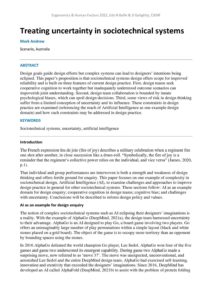| Document | Author Mark Andrew |
| Abstract Design goals guide design efforts but complex systems can lead to designers’ intentions being eclipsed. This paper’s proposition is that sociotechnical systems design offers scope for improved reliability and is built on three features of current design practice. First, design teams seek cooperative cognition to work together but inadequately understood outcome scenarios can impoverish joint understanding. Second, design team collaboration is bounded by innate psychological biases, which can spoil design decisions. Third, some views of risk in design thinking suffer from a limited conception of uncertainty and its influence. These constraints in design practice are examined (referencing the reach of Artificial Intelligence as one example design domain) and how such constraints may be addressed in design practice. |

